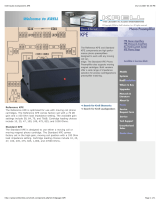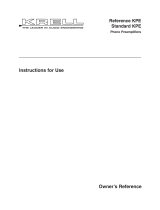
© Danfoss A/S (AC-DSL/MWA), 11-2006 DKRCI.PI.000.B1.02 / 520H1298 1
148R9541
148R9541
Instructions
General instruction
for ATEX products
Danfoss Industrial refrigeration standard
products are primary designed to be used
with common “industrial” refrigerants like
ammonia, CO
2
, and halocarbons, however
specific valve types can be used to HC
refrigerants (flammable).
European Directives
If not specifically mentioned all Industrial
Refrigeration valves comply with the
relevant European Directives like the
Pressure Equipment Directive (97/23/CE).
ATEX directive: (94/9/CE)
The ATEX directive specifies the
requirements for equipment intended for
use in potentially explosive atmospheres.
Danfoss Industrial Refrigeration products
have been verified according to this
directive.
The products are divided into 3 main
groups:
I) Products which are (type) approved
to be used in potentially explosive
atmospheres (zone 2, zone 1 or zone 0).
(Table 1, group F)
These products are marked and are
available with “Certificate of
Conformance” acc. ATEX
II) Products which can be used in
potentially explosive atmospheres, but
are not covered by the scope of the
ATEX directive.
(Table 1, group A, B, C and D)
These products are available with
“Manufactures Declaration” according
to ATEX.
Note: Due to material compatibility
specific product type / code no. has
to be used for HC refrigerants. (E.g.
components with O-rings. see table 1,
group D)
III) Products which have an ignition source.
These products must not be used in
potentially explosive atmospheres.
(Table 1, group E)
These products are available with
“Manufactures Declaration” according
to ATEX.
Installation
General remarks
For safety reasons, the installation must
take place under the supervision of an
authorised person taking account of local
safety instructions, for flammable fluids,
and advisories.
The handling of valves and their controls
must be done by staff trained in all
technical aspects of their operation.
Before installation the pipes must be
depressurised and purged (empty of its
fluid) in order to avoid any danger to the
operator.
In ATEX zone, check that the pipes are
connected to the earth (grounded).. Do not
use insulating pipes (PVC…)
– Check that the valves are suitable for
the actual refrigerant.
Note: Type designation “xxxE”, are used
for products containing O-rings, and are
suitable for flammable (HC) refrigerants.
– Check that the valves are suitable for
the actual zone.
Commission
Before putting valve into operation, check
that:
– The working conditions are compatible
with the details given on the
identification plate , this instruction
notice and the manufacturer’s details
(technical data sheet, price list
catalogue, advisory service).
– All electrical connections have been
properly made.
– Installation is tight after the assembly.
Maintenance
– Maintenance and repair work must be
carried out by qualified personnel.
– The pipe must be depressurized and
purged (emptied of its fluid) in order
to avoid any danger to the operator.
If the installation has carried fluids
which are dangerous in themselves if
in contact with the outside atmosphere
(inflammable, corrosive, toxic,
explosive..)
– All operations must be performed using
suitable protective (clothing, gloves,
mask…).
– Where a control uses an external energy
source, it is essential to isolate this
source before any operation.
Warning:
When used in an ATEX zone,
electrostatic charges may be present
inside the valve. The user is responsible
for taking all precautions to avoid this
risk.
Safety
As well as the indications given in the
preceding paragraphs of this notice, it is
imperative that the following instructions
be followed:
– This notice must be available on site
where valves are installed.
– Personnel carrying out any intervention
on the valve must be qualified for the
task. In ATEX zone, the personnel must
be educated in the risks of explosion,
and should have received specific ATEX
training.
– In case the forwarded media would
be an explosive atmosphere (deliberate
internal explosive) or should it cause an
explosive atmosphere in case of
external leakage, the user must check
the tightness of the installation after
assembling, after a faulty operation
or on a periodic basis undernormal
conditions
– It is the responsibility of the user to
check after the installation of the
valve that there is no leakage. Especially
in case of deliberate internal explosive
atmospheres.
– Internal rules and legislation current
in the country concerned with respect
to health and safety at work must be
applied and respected.
– The valve and its control must not
undergo any modification without prior
approval from our advisory service.
Danfoss is not responsible for any
damage which may be caused by the
use of parts, accessories or controls
which are not original Danfoss parts
– Hot or cold parts of the valve which
present a danger to the operator must
be protected.
– In ATEX zone, the valve and its control
must be cleaned regularly to avoid the
accumulation of dust.
– In ATEX zone do not mount valves at
open ends of lines.
ENGLISH



